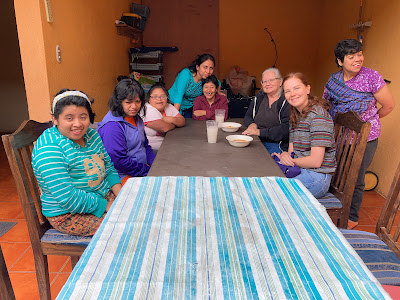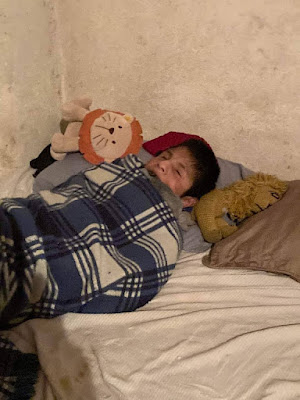Please don't take this to mean that whenever someone asks to come live with us we immediately agree. We have criteria for those whom we can adequately serve, and don't go outside those parameters. Sometimes, though someone comes to us, and it is absolutely clear that they are either being abused or will not survive without our care. As a team we discuss this and pray over it, and if it is clear it is God's invitation to join in what He is doing, we accept it, trusting His provision.
This has happened twice in the past six months. And, now that these two folks are part of the Reason to Hope family in Guatemala.
Last March we were contacted by a fellow missionary asking if there was any way we would consider taking 23 year old Josué into our home. He has cerebral palsy and was thought to be autistic. (Upon arriving to meet him, we discovered he was also blind.)
His mother had cared for him as best as she could, but died in the national hospital in Coban after breaking her hip. (Yes, here you can easily die of a broken hip.) He was now being inadequately "cared for" by an elderly lady and her developmentally disabled son.
Josué's transition to Casa de Esperanza was not easy, but six months later, he is a completely different young man than the one who came to live with us.
Then, last August, we received an email from the director of a center for individuals with additional needs at Lake Atitlan. I have visited this center in the past and knew the staff to be both capable and caring. Seno Viviana asked if there was any way we could accept an 18 year old woman who attended their center. When the staff had visited her in the home of her aunt who was caring for her, they found her locked in a room and were told the key to the room could not be found. When they finally did get in to see her, they found her lying on a dirt floor, with only a piece of cardboard for a "mattress" and a thin rag for a blanket. Would we help?
Aracely is developmentally delayed, but quite independent and without physical limitations. After interviewing the staff at the center, we decided to accept her on a trial basis. The staff was thrilled, and made all the arrangements for her to come and live with us, as well as provided the needed medical exams and transportation.
Adjusting to living with four other young women as well as the three staff who live at Hijas del Rey has been challenging for Aracely. She tends to withdraw into herself when scared, angry or frustrated. She often fights for control when she feels insecure. But gradually she is learning that she is safe and will be well cared for and is beginning to trust more and "fight" less. She is becoming a contributing member of our family at the women's home, and beginning to make friendships with the other residents. The trial visit has proven successful, and she has joined our group permanently.
As I was writing this post, I received an inquiry requesting placement for a 22 year old man with osteogensis imperfecta (brittle bone disease). He grew up in an orphanage, and "aged out" at 18 years old. He returned home to live with his father where he is often left alone for long periods of time and seldom given food. We will evaluate him to see if Casa de Esperanza would be a good fit for him.
How will we respond? I honestly don't know. What I do know is that with each new resident, the cost of operating our homes increases. While this is not the deciding factor, it is a consideration, and a reality which we must face.
Both our homes have the physical space for more beds, but with the addition of each new resident it seems our structure becomes a little more rigid, and a bit more "institutional." I do know that for every one person we include, there are 20 more in Guatemala in an equal state of need. Ten homes like Casa de Esperanza and Hijas del Rey could not satisfy the demand.
We cannot meet every need, and we don't go looking for more residents. However, when God puts someone in front of us, inviting us to obey and serve Him by caring for that person, we dare not say no.
So, where will it end? I don't know. I know that 12 years ago Casa de Esperanza was not even a dream, and now we stand with eleven residents and an equal number of full time staff members. And God has provided as we respond to His call. So as He continues to call, we will give our "yes" and trust Him to do the rest.





